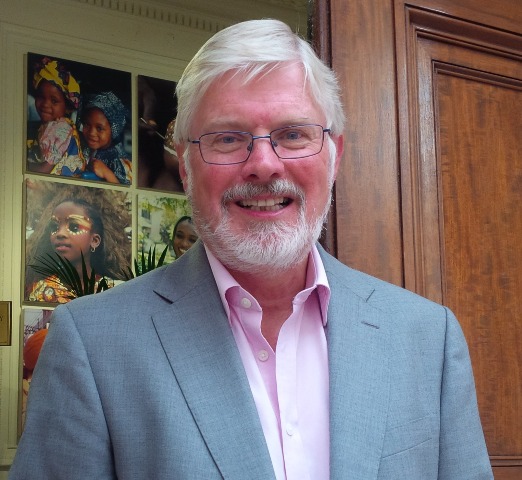 Stuart Mole ended two terms in office as Chair of the Round Table Editorial Board in June 2017.
Stuart Mole ended two terms in office as Chair of the Round Table Editorial Board in June 2017.
Six years is a long time. Syria, Sudan, Yemen, and Iraq. The refugee crisis. Brexit and Trump. And, for the Commonwealth, lacklustre leadership, indifferent national commitment, and a damaging equivocation over human rights in post-conflict Sri Lanka, has helped create a malaise (and a funding crisis) from which the Commonwealth Secretariat, certainly, has yet to recover. So, now at the end of my six-year term as Round Table Chair, what are our prospects?
In one sense, The Round Table has been remarkably unchanged in its 107-year existence. It is still both a published journal and a forum of debate and advocacy. As a hybrid, even today it is driven by a duality which is often complementary and mutually reinforcing and only occasionally a source of tension and strain.
Of course, the nature of that hybrid – and the world it inhabits – has changed in ways its founders could never have imagined. I still enjoy receiving my copy of the journal once every two months and look forward to exploring its contents at my leisure. When I browse over past issues, perhaps of many decades ago, there is a pleasure in handling the bound volumes. The cover opens to articles that are sometimes far-sighted and gripping and on other occasions hopelessly reactionary and pedestrian but they all tell a story of their age and of a challenging world usurping the old certainties.
I doubt that the print copy will disappear but the journal’s future – and its profitability – lies with its online presence. That is why The Round Table rightly upgraded its website and, nearly two years ago, appointed a website editor, Debbie Ransome, to work alongside Venkat Iyer, the editor of the journal. Together they have made anew a unique intellectual space for commentary on contemporary Commonwealth and international affairs.
Many years ago, The Round Table had influential and substantial satellite groups in the dominions – Canada, Australia, South Africa, Ireland, and New Zealand – and correspondents who contributed regularly to the journal. Today, we have Round Table ‘chapters’ in Australia, Bangladesh, and India, with others expected to emerge in Malaysia and Canada. They provide different centres of insight and perspective. The International Advisory Board contains a global network of eminent academics, who are all invited to contribute in various ways. And, several years ago, an ‘opinion’ section of the journal was launched so that shorter, more immediate commentary (of around a thousand words) could be produced, alongside more substantive, peer-reviewed work (of five or six thousand words).
In 1910, The Round Table was a powerful political lobby, arguing for ‘imperial federation’, and for many of the developments which would result in today’s modern Commonwealth. British Cabinet MInisters can no longer be found in membership, though the organisation still attracts journalists, academics, Commonwealth practitioners, government officials and, yes, the occasional political figure to its debates and activities.
That is what I found so appealing when I was invited to join the Round Table over twenty years ago. At that point, I was holding down a pressurised and fast-moving role as Director of the Secretary-General’s Office in the Commonwealth Secretariat. It was not only the stimulus of the journal and its ideas which I welcomed: it was the dinner meetings, the seminars, and the conferences which allowed me to step outside my frenetic and rather blinkered existence and reflect more broadly about the Commonwealth and its role in global affairs. That unique physical (as well as intellectual) space is one I have cherished ever since. Indeed, I was glad to help take our role as a forum of advocacy one step further when we became an accredited Commonwealth organisation, with access to the highest Commonwealth circles and the opportunity to develop partnerships with many Commonwealth organisations.
Of course, the journal must never cease to speak out, wherever it sees the need, especially where the integrity and credibility of the Commonwealth is at stake. But, by virtue of its position, it always carries the responsibility to uphold the highest standards of inquiry and comment.
We have also hugely benefited from the belief and support of our publishers, Taylor & Francis. Their commitment is not only to the direct commercial operations of a successful journal. It also involves supporting the website and the Round Table’s regular conferences, as well as funding an annual Routledge/RT postgraduate scholarship.
A new phase in the Round Table’s future now begins, with the election of Victoria Schofield as Chair. What are the priorities for The Round Table in unsettling global times – for the Commonwealth and for multilateralism more generally? What changes can we expect to the journal – and to the ‘moot’, as a forum of advocacy? Should we recognise the many currently outside the organisation who read the journal, visit the website, and regularly attend its activities by creating a broader and more inclusive membership?
These are all questions for the future but I have full confidence that the Round Table’s editorial team, its officers, and the editorial board, together with our publishers, will continue to value and to nurture the remarkable intellectual and practical space which the Round Table offers.
Related articles



